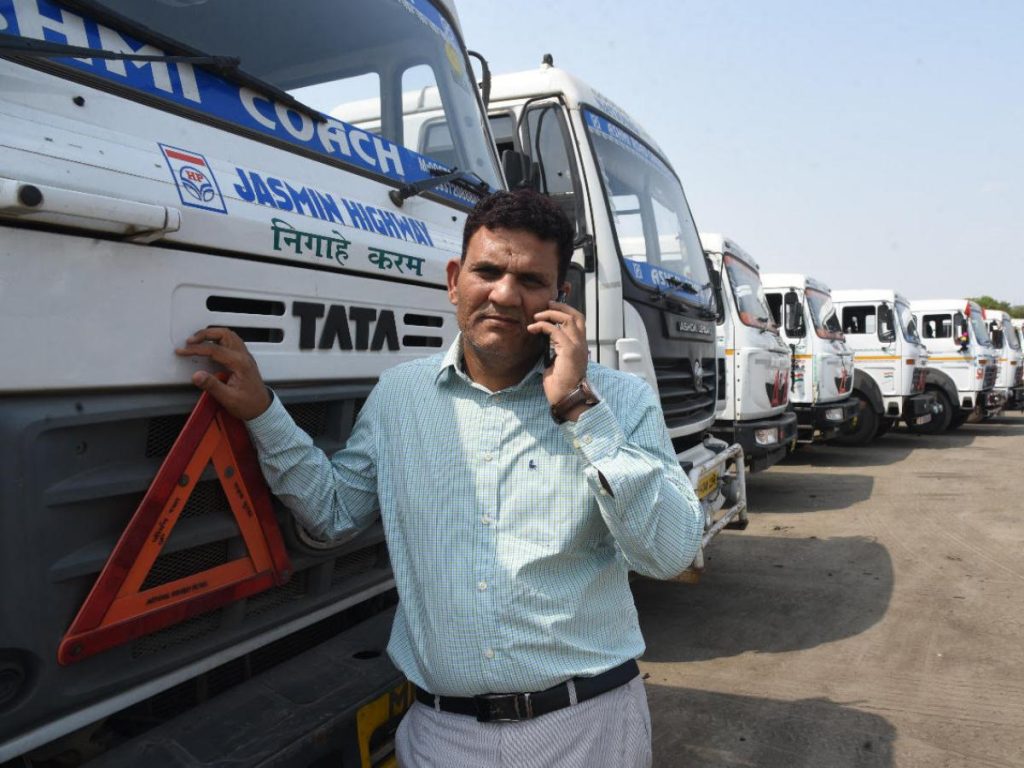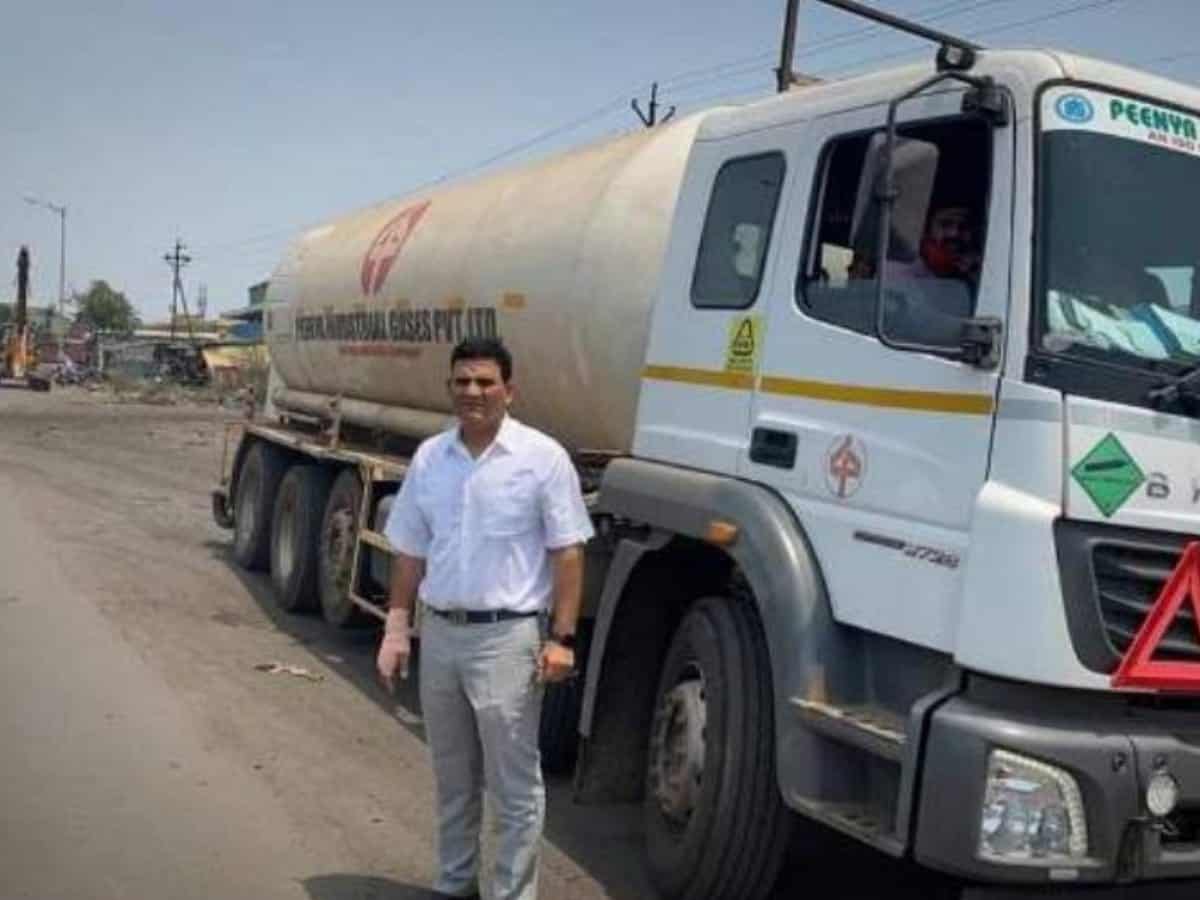By Moin Qazi
Everyone can recognize an entrepreneur when he sees one, but no one really knows how they became one. Was it nature – they were just born to build things – or was it nurture – their environment moulded them into innovators and path builders.
They say all it takes is a few thousand rupees and a dream. Fifteen years ago, Pyare Zia Khan was not too far off from that. With twelve thousand rupees to his name, Khan decided to take the ultimate leap of faith, and set out to follow a dream and become a transporter. What finally materialized was a true rag to riches epic.
But more important than the story of a successful entrepreneur is the saga of a socially conscious businessman who is combining both financial and social values in his business model. For Pyare Khan, the best Zakat or charity during the holy month of Ramzan was to help the pandemic-ravaged city get oxygen. He has arranged over 20 oxygen tankers for the city at his own expense as the city grapples with shortages of the life-saving gas.
Pyare Khan spent Rs. 1 crore
Khan has spent around Rs 1 crore for procuring oxygen tankers, oxygen concentrators and cylinders. Through newspapers, he learned about the severe shortage of oxygen in hospitals.”The holy month of Ramzan had started. We offer Zakat (donation for charitable causes) during this period, and I thought this time instead of giving Zakat to a mosque or madarsa, we should do something to address the shortage of oxygen,” Khan said.
Initially, he contacted suppliers in Bengaluru and arranged two oxygen tankers, paying two or three times the normal rate. Khan roped in the drivers working for his transport firm to bring five tankers from the eastern coast city, he said.”We have till now arranged about 20-22 liquid oxygen tankers and spent about Rs 1 crore,” Khan added. He has also donated Rs 50 lakh for procuring 116 oxygen concentrators for government-run COVID-19 hospitals in the city.
Son of a small-time grocer, Khan once lived in the slums with his mother, Raisa Khatoon, wife and two daughters. From his humble beginnings, working through a lot of terrible jobs while growing up, selling oranges at a railway station and driving auto-rickshaw to owning a Rs 400 crore worth transport company (Ashmi Road Transport Pvt Ltd registered, in 2013 ) Khan’s life sparkles as a lesson in perseverance and commitment. Through hard work, and remaining true to his internal moral compass, he build a business empire that now includes his own fleet of 300 trucks, and over 3,000 trucks which he hires every day to move steel and power infrastructure across India. The company has 10 branch offices across the country and employs 1200 people. 75% of the transporters from Central India lend their vehicles’ for the logistical operations that he handles across Nepal, Bhutan and Bangladesh.

Before setting out his business horizon, Khan was very clear about his personal goals. His ambition was to become a job creator, and not a job seeker. He believed that you need an idea where you can succeed by being yourself, not fail by being like everybody else. Khan’s story has a clear message. Business school teaching cannot by itself make an entrepreneur. It can only sharpen the latent talents. At the peak of his career, his advice is: “work hard, never give up and believe strongly in your dream. Don’t ever become complacent. Have a team of passionate and purposeful people with a diverse skill set but similar values and beliefs, all willing to push you forward in a positive way.”
Khan has used his own instincts to chart an entrepreneurial trajectory that has now become a sophisticated business philosophy. Management is an application-oriented field where problems have to be solved. I have a flair for problem-solving “, says Khan. Khan has a brilliant in-house team that fleshes out his vision, even though it his charisma that finally overrides them. They find resonance in Khan’s values and beliefs and are as keenly focused as him. Khan trusts them and their skills; they, in turn, recognize and acknowledge his inspiring leadership.
Khan never had corporate experience. He failed in matriculation examination twice before finally clearing it. Khan has designed his own indigenous management framework and feedback loop. Though he has to navigate a tough sector and a complicated ecosystem, he has been able to overcome or circumvent it by using approaches that recognize the gaps and help convert challenges into opportunities.
Khan’s journey
Khan’s journey began as a driver in a courier company but had to quit it because of an accident when he was 18. In 1994, he began driving an auto-rickshaw on rent. Within a year, he purchased a new one with help from his mother who gave him Rs 12,000. Till 2001 he drove the auto, but at the same time continued to nurse several dreams. He purchased a 52-seater bus which failed to give him the desired returns, forcing him to sell it.
Khan was also part of Nagpur’s Melody Makers group where he played the keyboard during those days. He needed a bus to ferry his group to programme venues. So he bought one by selling some of his assets but the venture couldn’t succeed. In 2004 he decided to acquire a truck. Khan obtained an Rs 11 lakh loan in 2004 and purchased his first truck. “I bought the truck and worked hard by taking consignments to places like the North East, Jammu and Kashmir where other transporters refused to go,” he said. From then on, the business has been on an upward trajectory.
Khan chased more than a dozen banks before convincing a lender for a loan to buy a truck. His story has a lesson for bankers and puts their appraisal models on their head. His early frustrations were on account of the rejection of his loan application because he lived in a locality where residents had bad credit scores and were perceived as risky clients. Technology has helped banks to extend the boundaries of what could be achieved with a given level of resources. However, while number-crunching with computers can help decision-making, it cannot replace it. Someone in a particular area might pay off your loan well, but computer modelling tells us that anyone from that area is likely to default because the credit culture in the area may have been bad. Excessive standardisation can lead to the rejection of a loan based on opaque reasoning premised on arbitrary factors such as place of residence.
Khan recollects an interesting business episode. “In 2016, I undertook an assignment for KEC International to transport their transformers to Bhutan. The transportation entailed laying a 30-km road by cutting trees in some of the troubled areas of the Northeast and propping up weak bridges on the way to our destination. We reached Bhutan after doing all that but our trucks were stuck at a welcome arch that was lower than the height of our consignment. I requested the Bhutan authorities to allow me to dig the ground and promised to re-lay it later. They agreed and it was done.” Khan’s decision paid off because, like other successful entrepreneurs, he demonstrated courage throughout the process of innovation, bearing the burden of risk and staring failure repeatedly in the face. Khan’s recipe is simple. While the ingredients for a strategy may be the same, it is judicious mix of ingredients in the right proportion that sparks the magic.
Khan’s moment of glory came in 2018, when he won the top prize in a contest for young transport entrepreneurs, a programme organised jointly by IIM-Ahmedabad and Mahindra Truck & Bus. Her he found himself with a bunch of high profile people .Unlike the other 18 contestants, two of them from the US, who made elaborate PowerPoint presentations, Khan presented his case orally in Hindi without much fanfare and ado.
“When the organisers of the contest asked me to take part, I wasn’t sure. I didn’t even know what IIM was. So I went reluctantly, without knowing what to say,” recalls Khan. The IIM experts were astounded by his meteoric business trajectory because it defied conventional wisdom. It appeared that the business had a political godfather. But when they quizzed Khan at great length and probed deeper, they discovered a rare and genuine entrepreneur. They recognised that Khan’s success formula was a right combination of out-of-the-box thinking and a unique brand of determination. They found he had a “mind-map” for solving problems and was extremely good at intuitive decision-making.
Khan has developed a business model that takes care of the entire logistics chain. The company has its own workshop for maintenance of its fleet. Khan explains: “we save a lot in stocking our own fast-moving parts and servicing our trucks rather than opting for an Annual Maintenance Contracts. Anyway, none of our trucks are more than 5 years old and we sell them off before they demand large maintenance.”
Khan’s long-term goal is to keep a healthy balance between his business and social objectives. He believes that business should be conducted the way it was always meant to be—looking towards the future, practicing and building processes that are sustainable, respectful of the people and the environment. He affirms that in a free enterprise, the community is not just another stakeholder, but is in fact the very purpose of its existence.
Moin Qazi, PhD (Economics), PhD (English) (email id: moinqazi123@gmail.com).

